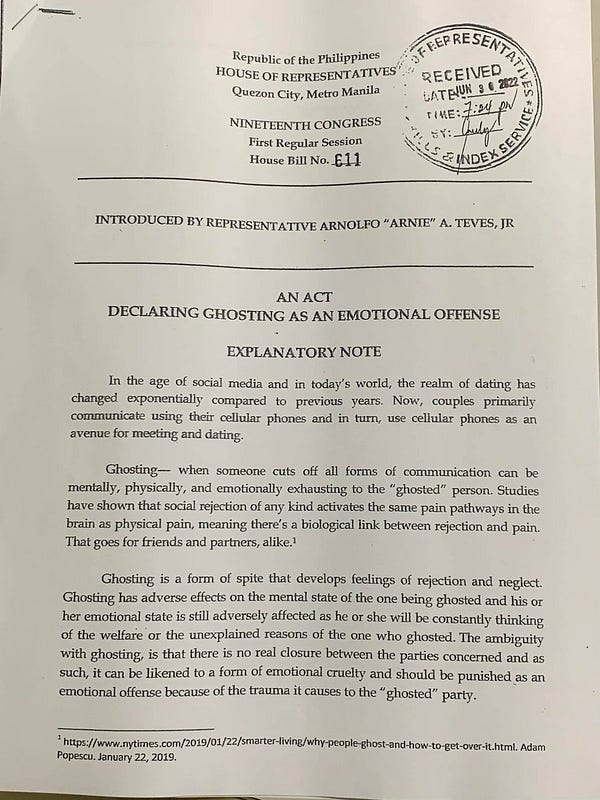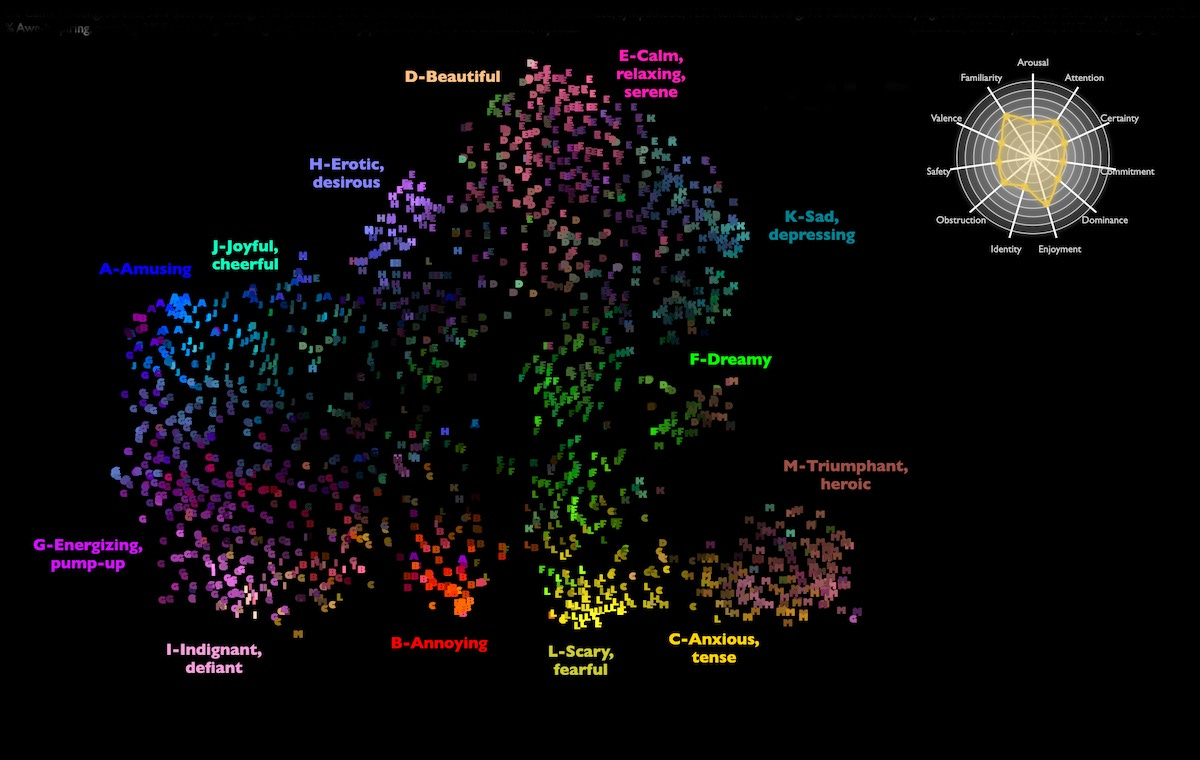Ghost in the machine
Emotion-detecting neckwear, team spirit, the somewhat-universal emotions of music, and ghosting crimes
Wearing your emotions on your sleeve (or neck)
Wearable technology has long been a part of the athlete experience. This week premier league champions Manchester City proudly reported that they are using connected scarves to gather data on supporters’ emotions during matches. The scarf relies on an EmotiBit, which is a device with a PPG sensor, accelerometer, temperature sensor, and electrodermal activity (EDA) sensor. The sensors are similar to those in your fitness tracker, but instead, translate physical signals into emotional categories. In this case, the device is nestled in the back of the scarf as a way to pick up these signals from the fan’s neck.
Okay, okay, so you’re wondering how can this possibly work, right? How might a little nugget of sensors transform all my internal, amorphous, complicated, mixed feelings that I don’t even know I’m having into one emotion?
Biometrics devices do pick up an elevated heart rate or sweaty skin that might indicate excitement but, these signals are ambiguous. Think of this scenario, you are settling into your seat feeling stressed because someone jostled into you and spilled your drink. As you sit, there you are anxious to find other friends you were supposed to meet but you don’t see them in your row as planned. Then you tug at your scarf because it’s actually quite hot in the stands. Still looking around, you notice a light show on a big screen that glows red. You’re not entirely sure what that means as you continue to follow the game. How does the device interpret all this?
There are five (probably more but let’s start with these) issues here:
Translating a biological signal into an “emotion” requires an imaginative leap (are you excited or overheated?)
Then, tethering that emotion to context (are you excited about the game or is it crowd anxiety?)
Next, interpreting ambiguous signals (a slower heart rate as you settle in but hot skin temperature) will likely default to the higher percentage (58% excited + 42% calm = excitement)
And the technology has to account for a certain time slice to make that judgment (will it read moment-by-moment, every 10 minutes, after the game?)
Displaying the emotion of the crowd back to the crowd is likely to induce a mirroring effect (everyone else is excited, I’m getting excited!!!)
So does that mean the club shouldn’t pursue it? Sports teams (and fans) love data and emotions are at the heart of sports, which means that experimentation could result in meaningful experiences. Or as the club contends, “serve as a study in shared passion.”
This isn’t the first face-off for emotion tech and sports. In 2015, Jaguar sponsored Feel Wimbledon where the company combined biometric, atmospheric, and sociometric data to relive the highs and lows of the games. After that, biometric emotion tracking has turned up at a variety of events, including the Superbowl. I’m sure we’ll see more experimentation as the technology develops.
Music that hits you right in the universal feels
Like the rest of us, psychologists wonder whether emotions feel the same to people from different cultures around the world. Recent research from the MARCS Institute for Brain, Behavior and Development, at Western Sydney University, summarized in Discover Magazine, tried to figure it out. The researchers looked at how communities with varying levels of exposure to Western music would respond emotionally to major melodies, typically associate with positive emotions, and minor melodies, often associated with negative emotions.
While there seems to be an element of universality across cultures, the degree of familiarity with Western music strengthened the emotional associations. In other words, culture and context influence, reinforce, or even change that perception of emotion. This research taps into the ongoing debate over whether emotions are universally expressed across cultures or are concepts that we create for ourselves over time.
If you want to learn more about what emotions are evoked by music, one of my favorite projects is by Alan Cowen of the University of California, Berkeley. In a survey of several thousand people from around the world, he found different kinds of commonalities. If you take some time to play with this interactive map , you may pick up on the patterns. Minor chords are sad, major chords joyful but tempo, rhythm, harmony, and other elements factor into it. Heavy metal is labeled defiant, Vivaldi’s Four Seasons left people energized, and, just as its composer intended, the shower scene score from the movie Psycho triggered fear.
What would it mean to criminalize ghosting?
In the Philippines, proposed House Bill 611 would declare ghosting as “a form of emotional abuse when a person is engaged in a dating relationship with the opposite sex, affecting the victim’s mental state.” The bill does not suggest penalties, only that “ghosting is a form of spite that develops feelings of rejection and neglect” which should be punished. The bill is widely thought to be a popularity stunt for Arnolfo Teves Jr., a member of the Nationalist People’s Coalition. Consequently, it hasn’t been treated that seriously in the news.
But let’s just ponder, shall we? If ghosting were to be criminalized, how would it work? The bill equates ghosting with social rejection that “activates the same pain pathways in the brain as physical pain” meaning that this type of “emotional abuse” could be seen as equivalent to physical abuse. Even if it doesn’t pass, the bill implies that ghosting is an offense worthy of punishment.




If it seems a little strange to legislate relationships, think again. There’s marriage and divorce, pregnancy and children, and many relationship-adjacent crimes like stalking, rape, and partner violence. The law is no stranger to emotion either. Crimes of passion, for instance, are not punished as harshly as “cold and calculated” offenses.
Beyond that, ambiguous emoji use and emotionally manipulative texting have already shown up in the courts. People have apparently already tried to sue each other over ghosting, and even celebrities are not safe from ghosting lawsuits. It’s not beyond the realm of possibility that we will see legislation on ghosting in the near future.
For now, it shows that defining online behaviors more clearly and examining the emotional effects is important! That leads us to this week’s emotion 👻
Friday Feeling > Ghosting
🔑 DEFINITION
The act of suddenly ceasing all communication with someone.
See also: Caspering, cloaking, orbiting, cold shoulder, silent treatment
📜 A BRIEF HISTORY
Ghosting happens when someone cuts off all online communication with someone else without an explanation. Like a ghost, they just vanish. The phenomenon is common on social media and dating sites, and it seems to be happening more than ever.
The word ghosting is relatively new but the behavior—leaving without further communication—is age-old. In person, there’s low-level ghosting like leaving a party without saying goodbye or not responding to a call. Spouses running away from relationships or parents abandoning children are its most serious form.
In the online world, the term originated in the early 2000s in the context of romantic relationships. Merriam-Webster found traces of the current definition of ghosting starting in 2006.
In the following decade, media reported a rise in ghosting, which has been attributed to the increasing use of social media and online dating apps. A 2019 YouGov survey of US adults found that 30 percent had ghosted a romantic partner. And now people ghost friends, relatives, and employers too.
❝ QUOTE
“Honey, I rose up from the dead. I do it all the time.” —Taylor Swift
🧩 MOTIVATION
The reasons why we ghost are complicated.
Conflict avoidance, the most common cause of ghosting is to avoid emotional discomfort. Avoidant attachments types may be more prone to it.
Fear, especially fear of the unknown—about getting to know someone new or how they might react to a breakup.
Feeling overwhelmed, the volume of choice in dating or the number of friendships can make it difficult to maintain casual relationships.
Inflicting pain, more rarely ghosting can be passive-aggressive or just plain vindictive.
Growing apart, relationships evolve and people change so this type of ghosting might be more of a slow fade.
Lack of consequences, if you’ve barely just met someone, the stakes of ghosting seem low.
Self-care, cutting off contact may be the best way to end it with someone who lies, sends inappropriate content, makes you feel unsafe, or just doesn’t get the hint.
Meh, just not being that into it, getting too busy, or too much time passing are sometimes the reasons behind ghosting too.
💬 EXPRESSION
By definition, ghosting is a lack of response but that doesn’t mean there isn’t nuance.
They ignore your text, email, or other message but like your post elsewhere
They ignore your text and you can see they are active on other platforms
You see a read receipt but they never respond
They leave a text unread and don’t respond
Each carries a different emotional weight.
💗 EXPERIENCE
Ghosting can negative consequences for mental health. Short term, rejection can stir up all kinds of uncomfortable feelings resulting in lower self-esteem. Long term, the ghostee may be less apt to trust in future relationships. If they internalize all those negative feelings, there’s the possibility of sabotaging subsequent relationships too.
As for the ghoster, feelings of remorse or guilt are common. Some may feel that it limits their growth or their capacity to form bonds if it becomes a habit.
For both the ghoster and the ghostee, it might make it harder to establish intimacy in any relationship. Whether you are the ghoster who is avoiding difficult conversations or the ghostee who is worrying about being hurt all the time, ghosting limits vulnerability which is the number one pathway to forming bonds.
💪 PRO TIP
Ghosts typically aren’t proud of their behavior, they just don’t know how to have uncomfortable conversations. So, here are a few ways to head off ghosting or just feel better about being on the receiving end.
Set expectations. Do you expect them to check in every day? Week? Be transparent about what you need.
Be honest. Say that you’ve been ghosted before and would prefer that they just say farewell rather than leaving you wondering.
Give it a time limit. Haven’t heard from them and are tired of waiting? Send them a message asking for a response, or you’ll assume the relationship is over. Harsh, but it can give you closure.
Don’t automatically blame yourself. Since you may have no idea why the other person left the relationship, try not to cause yourself further emotional harm.
Whether you’ve been ghosted or are the ghost in question, the golden rule still applies: treat others how you would want to be treated, with kindness and respect.
🎉 FUN FACT
Gothic tropes haunt our experience of the internet. We have social media stalkers and digital doppelgangers. People live on after death as an online presence. As we slip through solid objects, our lives can start to seem more spectral presence than flesh-and-blood.
And relationships online are the stuff of gothic novels. There are ghosts, who disappear into the ether all at once or slowly fade out. Then there are hauntings, where a ghost rematerializes unexpectedly. And there are zombies, springing to life years later.
🤔 LEARN MORE
Read about why ghosting is so painful in New Scientist and how to get over it in The New York Times
Hinge had a podcast called Ghost Stories, which disappeared after only 5 episodes
On MTV’s Ghosted, Travis Mills and Rachel Lindsay hunt down disappeared best friends, cousins, and exes
Yes, there’s been a novel about ghosting too, Ghosted by Rosie Walsh, which has sold over 1 million copies already
Self’s guide to modern dating slang includes a few terms that are new to me!
<👻👻👻
That’s all the feels for this week!
xoxo
Pamela 💗



